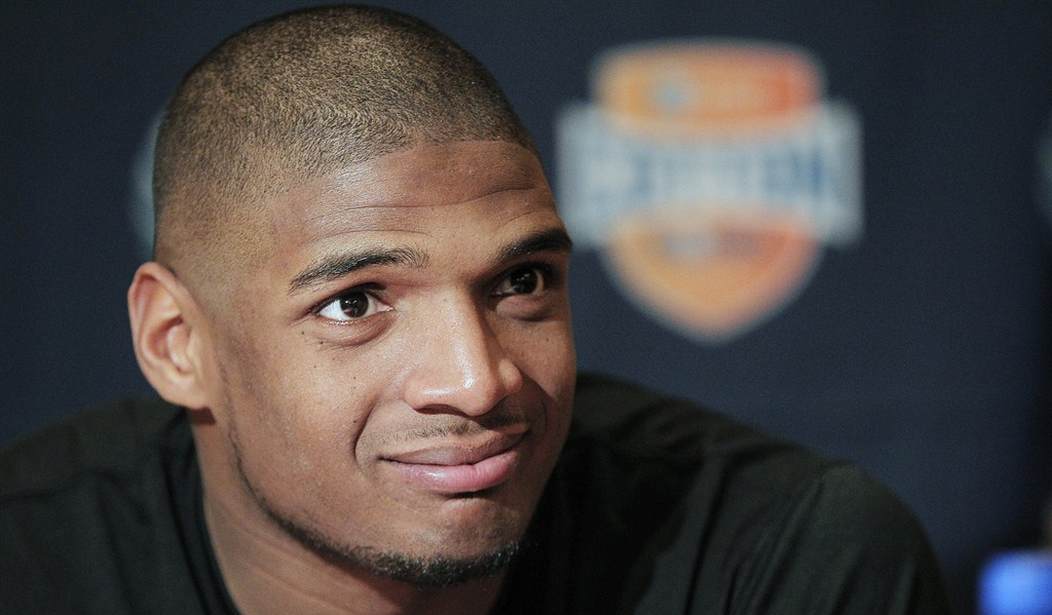Michael Sam appears to be a fine young man. But, no, he isn't the first openly gay male U.S. athlete to play in a major sport. And "brave"? Can we please dispense with the absurd Jackie Robinson comparisons? Wake me when a black collegiate pro prospect "comes out" as a Republican.
A starting senior on the University of Missouri football team, Sam looks like a mid-round draft pick in the NFL. He recently "came out" to his teammates, many of whom said they already knew or suspected. Neither teammates nor coaches had an issue. Most normal people ask, "Who cares?" or "Can he play?"
Some, however, liken Sam's "pioneering status" to that of Jackie Robinson, the first black man to play in the modern baseball major leagues. "Michael Sam has the opportunity to be the Jackie Robinson of the NFL," said professor Orin Starn, chairman of Duke University's cultural anthropology department. "Michael Sam is a Jackie Robinson Moment For NFL," according to the editorial headline in the Boston Globe. And then there's Fox Sports analyst Brendon Ayanbadejo who said, "We were there to celebrate his groundbreaking voyage that in many ways is similar to those of Jackie Robinson and Rosa Parks."
Where to begin?
First, Sam isn't even the first openly gay male athlete to play in a major American pro sport. That distinction goes to Glenn Burke, who played with the Los Angeles Dodgers and the Oakland Athletics from 1976-1979. He might well have played longer and been more successful had he not clashed with management -- not his teammates -- over his sexual orientation.
Recommended
Burke was "out" to teammates, management and sportswriters. It is not Burke's fault that both media and management preferred to say nothing. Dodger management reportedly offered him money to go through a sham marriage. Burke refused.
Dodger manager Tommy Lasorda, whose son died of AIDS in 1991, allegedly helped engineer a trade of Burke to Oakland because of a friendship between Lasorda's son and Burke. The trade of the popular, outgoing player stunned many Dodgers. Team captain Davey Lopes said, "No one cared about his lifestyle."
Traded during the 1978 season to the Oakland A's, Burke ended up managed by the openly homophobic Billy Martin. The volatile manager, according to a documentary about Burke, "baited" him with gay slurs. Frustrated, and never realizing his potential, Burke left baseball in 1980 and became a drug addict. A former Oakland teammate, Shooty Babitt, said, "They ran him straight out of the game." Burke died of AIDS in 1995. He was 42.
Sam will encounter no Billy Martins. He enters an NFL with a written policy against discrimination based on race, religion, ethnicity and sexual orientation.
Second, let's discuss Jackie Robinson. Many of his own teammates signed a petition stating they would not play with him. At least one petitioner was traded .
Viciously taunted, and sometimes threatened by players, fans and others, Robinson faced enormous pressure to not only play well, but to do so while restraining the desire to punch somebody in the face. Had Robinson not "succeeded," the path for other black players would have become even more difficult, about which the former UCLA student was quite aware.
The attention and pressure on Robinson makes Sam's future career look like a coronation. Robinson's was a pre-television, pre-Internet, Jim Crow America, where sports fans really paid keen attention to only three sports -- boxing, horseracing and America's pastime, baseball. Most everybody was watching, many hoping and expecting him to fail. Robinson played Major League Baseball for 10 years and died early. His death certificate described the official cause as a heart attack. But it might as well have said pressure and stress killed him. He was 53.
Yes, Sam will have some challenges. But tell that to Hank Aaron.
In his autobiography, "I Had A Hammer," Aaron writes about when he and others were the first black players to play the South Atlantic League -- a minor league affiliated with the majors -- five years after Robinson entered the major league. Southern newspapers, covering the "Sally League," refused to print pictures of the black players. Taxi drivers in places like Florida refused to pick them up. Players, Aaron said, could be arrested simply for being on the street at night.
Robin Roberts, the Hall of Fame Philadelphia Phillies pitcher, broke into the major leagues the year after Robinson. Roberts recalled a double-header in Philadelphia when Robinson tore the cover off the ball while playing dazzling defense. The next day, Roberts' manager, Ben Chapman, approached Robinson. "Robinson," he said, "you're one hell of a ballplayer, but you're still a n--ger." Robinson, according to Roberts, just smiled and walked by. Chapman was fired not long after. Robinson is in the Hall of Fame.
To forget Burke wastes an opportunity to remind us of how far we have come. To liken Sam's challenges -- and there will be some -- to those faced by Robinson diminishes the legacy of number 42.

























Join the conversation as a VIP Member